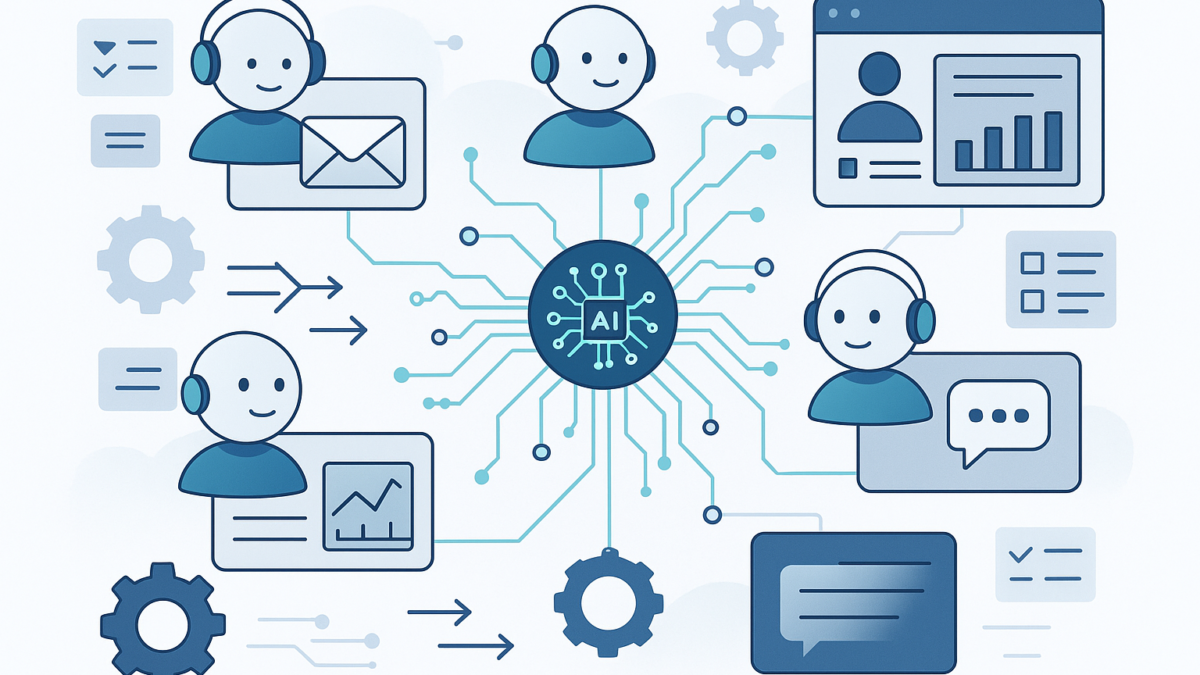What Are AI Agents? The New Era of Autonomous Workflows
Table of Contents
Introduction
In 2025, artificial intelligence isn’t just assisting work—it’s doing the work. Welcome to the age of AI agents: autonomous digital entities capable of executing complex workflows without human intervention.
Unlike traditional software or even AI chatbots, AI agents don’t just follow rules—they make decisions, take actions, and interact with other systems. They’re reshaping how we work across industries, from marketing and software development to finance and customer service.
This blog unpacks what AI agents are, how they function, and why they’re driving the next wave of productivity and transformation.
What Are AI Agents?
An AI agent is a software-based system that can autonomously perceive, decide, and act in a given environment to achieve specific goals. Think of it as a digital employee that understands objectives, takes initiative, and learns as it goes.
Unlike basic automation or traditional bots that require human-triggered rules, AI agents can:
- Understand natural language instructions
- Use multiple tools or APIs
- Make decisions based on real-time feedback
- Learn and adapt over time
Example: Instead of writing 10 marketing emails manually, an AI agent can research the audience, write the emails, personalize them, schedule them in your ESP, and even A/B test subject lines.
AI Agents vs. Traditional Automation
| Feature | Traditional Bots | AI Agents |
|---|---|---|
| Rule-based | ✅ Yes | ❌ No |
| Requires Human Input | ✅ Usually | ❌ Minimal |
| Multi-step Tasks | ❌ No | ✅ Yes |
| Tool Interactions | ❌ Limited | ✅ Integrates seamlessly |
| Adaptability | ❌ Static | ✅ Learns and improves |
Bottom line: AI agents are smarter, more autonomous, and built for complex workflows—not just repetitive tasks.
How Artificial Intelligence Agents Power Autonomous Workflows
AI agents are now capable of completing entire business processes from start to finish. Here’s how they work in real-world scenarios:
Sales & CRM Management
- Scrape data from websites or LinkedIn
- Auto-enrich CRM records
- Prioritize leads and trigger outreach campaigns
- Set reminders or schedule meetings in your calendar
Tool Example:Humata.ai, Aalign.io for lifecycle automation
Customer Support
- AI agent triages tickets from multiple channels
- Resolves basic queries autonomously
- Escalates only when human assistance is needed
- Updates customer profiles and sentiment scores
Tool Example: Intercom with Fin AI, or Zendesk AI Agent
Content & Marketing Automation
- Research keywords, draft blogs, and suggest CTAs
- Create social posts and schedule them
- Monitor engagement and auto-optimize campaigns
Tool Example: Jasper, Copy.ai, and Notion AI integrated via Zapier or Make
Finance & Ops
- Monitor transactions, flag anomalies
- Process reimbursements or invoices
- Communicate with vendors through automated emails
Tool Example: Ramp, Brex, or AI agents built with LangChain + ChatGPT API
What Makes Up an AI Agent?
To function like autonomous workers, AI agents typically include:
- LLMs (Large Language Models): Foundation models like GPT-4, Claude, or Gemini
- Memory: Ability to store context and use long-term info
- Tool Access: APIs, plugins, databases, or software integrations
- Planner/Executor Logic: To decide steps and execute in the right order
- Feedback Loop: To learn from results and retry intelligently
Many developers are now building AI agents using LangChain, AutoGen, or CrewAI frameworks.
Why AI Agents Matter in 2025
- Boost productivity by handling multi-app workflows 24/7
- Reduce costs by minimizing repetitive work and manual errors
- Accelerate growth through faster campaign execution, data processing, and real-time responses
- Enable leaner teams while scaling output
💡 According to Gartner, by 2026, over 40% of large enterprises will use AI agents in daily operations.
Real-World Example: A B2B AI Sales Agent
Let’s say a company wants to automate cold outreach. Their AI agent:
- Pulls a list of leads from LinkedIn
- Enriches data with company info using Clearbit API
- Writes personalized email intros
- Schedules follow-ups based on responses
- Updates the CRM in real time
- Notifies sales reps only when high-interest is detected
This is not a script. It’s an agent working independently like a junior SDR.
Final Thoughts
AI agents are no longer a concept—they’re operational teammates. Whether you’re in sales, support, marketing, or product, autonomous AI can handle parts of your workflow with precision and speed.
Businesses that embrace AI agents now will unlock exponential efficiency, while others will struggle to keep up.
Want to Deploy AI Agents in Your Workflow?
We help brands integrate AI into their business processes—from sales automation to customer engagement. Talk to our experts and see how autonomous agents can reshape your growth.





